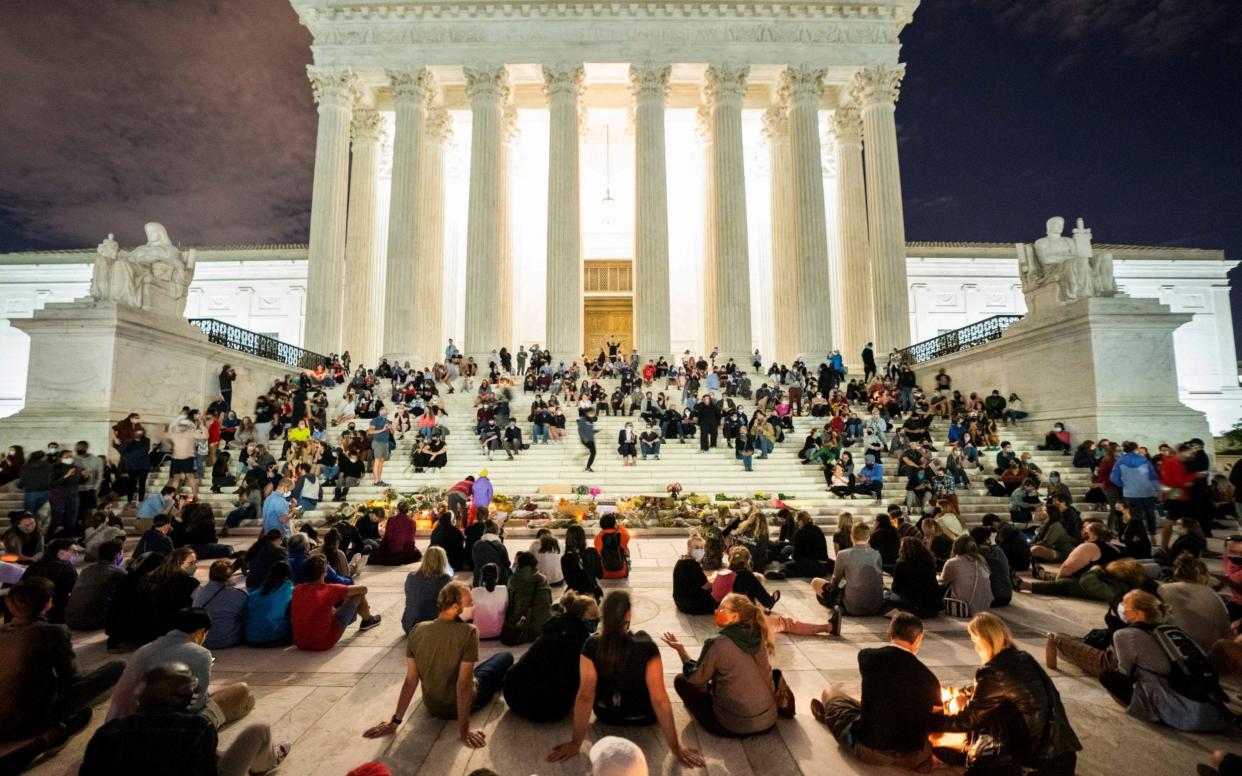Why the Supreme Court confirmation battle could help the Democrats win the election

In the latest Telegraph US 2020 Newsletter, US Editor Ben Riley-Smith explores the politics of the fight to fill the empty Supreme Court seat and how it could impact the election.
For more expert insight and exclusive analysis on the 2020 election from our US team, you can sign-up to the newsletter here.
We have been here before, kind of. Weeks out from a major election, a deeply controversial Supreme Court nomination, polls showing a gloomy outlook for Donald Trump.
The time was almost exactly two years ago. The elections were the midterms. And the person facing confirmation for the seat, in that case, was Brett Kavanaugh.
The nomination fight was one of the most controversial in recent years. Mr Kavanaugh was facing a slew of historic sexual assault allegations, all of which he denied.
The Democrats smelt blood and pushed hard. The Republicans won and got him confirmed. And in the end Mitch McConnell, the Republican leader in the Senate, said thank you.
“It’s been a great political gift for us,” Mr McConnell said as Mr Kavanaugh was appointed. “The tactics have energised our base.” Weeks later the Republicans grew their Senate majority.
A consensus has built up, based on recent decades, that the Republican base much more than the Democratic base gets motivated by adding new judges to the Supreme Court.
You have seen that voiced in the days since Ruth Bader Ginsburg’s death, creating an open seat and giving Mr Trump the chance to get a third nominee onto the bench.
The impact on the court is apparent - the opportunity to create a 6 to 3 conservative majority that could through its rulings shape American life in untold ways for who knows how long.
The impact on the election, now less than six weeks away, is less clear. Initially Mr Trump seemed the obvious beneficiary.
The news agenda would switch from coronavirus, which the president is seen by most Americans to have mishandled, to issues like abortion, guns and God, more traditional Republican territory that could tempt back party waverers.
One question is now being asked with increasing volume: Could the Republicans' apparent determination to force through a confirmation before November 3 actually help Democrats take the White House and the Senate?
There are evidence points backing that up. Take fund-raising. Act Blue, the digital donations site for the Democrats, had its biggest hour in 16 years after RBG’s death was announced. Then its biggest day. Then its busiest weekend.
A huge $160 million was raised. For strategists the surge showed how energised the Left was on the issue. Ms Ginsberg was a left-wing icon, the most liberal justice on the court. The fight to come has fired up progressives.
Then there is healthcare. It is widely believed the issue that won the Democrats the House of Representatives back in 2018 was Mr Trump’s drive to scrap Obamacare, his predecessor’s flagship healthcare law, and with it protections that made sure people with pre-existing conditions got insurance.
Now the Democrats are attempting to play the same record. The Supreme Court is scheduled to hear a legal challenge over Obamacare the week after the election. They are asking: What happens if Mr Trump has his new nominee on the bench by then?
The message is coming from Mr Biden down. It is sure to be clipped up into adverts soon. The president knows this flank is vulnerable and is going out of his way to make assurances over pre-existing conditions, with another expected this week.
Healthcare consistently ranks high on top of mind issues for voters. Fears Mr Trump’s push to repeal Obamacare could see millions lose their health insurance worked in 2018. It could, given the backdrop of the pandemic, work again.
And then there are young liberals. This cohort Mr Biden has consistently struggled to win over. He kept losing the under-40s vote to Bernie Sanders, the left-wing senator from Vermont, in the early Democratic primary states.
Here is an issue to rally progressives to his side. It is no coincidence that Alexandria Ocasio-Cortez, the progressive poster child, was standing next to Democratic Senate leader Chuck Schumer when he gave his reaction to Ms Ginsberg’s passing.
Despite her youth (she is 30) and junior position (she has not yet served two years) Ms Ocasio-Cortez, the Democratic leadership knows, can excite their left-wingers.
Republicans, it appears, have taken the decision to bank their control of the White House and the Senate by filling the Supreme Court seat while they can, before November 3.
This means they lose the 'prize' of an open seat with which to tempt supporters to the polls, but is the risk they are willing to take to secure the confirmation as soon as possible.
If they succeed - as the public positions of Republican senators suggest they will, even before a nominee has been named - the impact on the court and the country will be profound.
For the election, however, it could be the Democrats and not the Republicans who benefit most come voting day.

